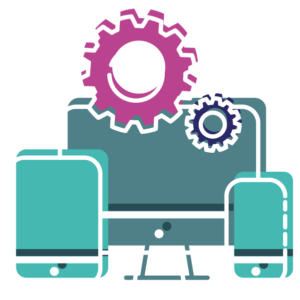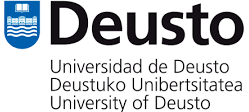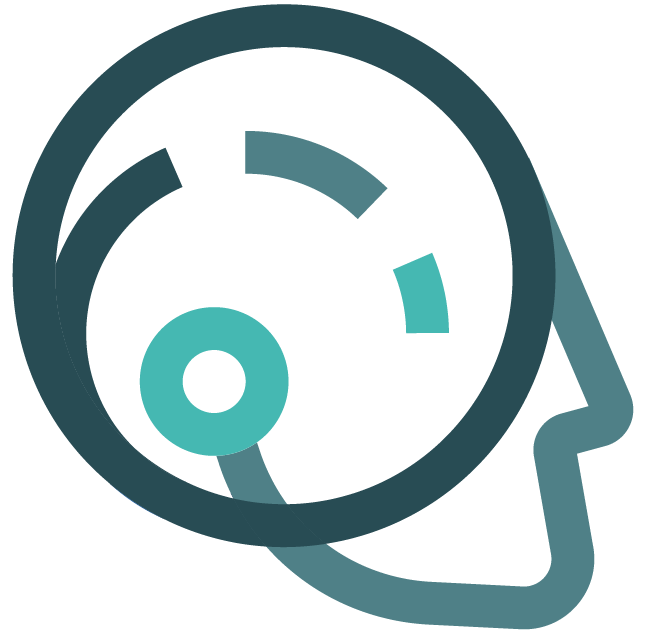CODEAI
Collaborative development of AI capabilities in SMEs
Artificial Intelligence (AI) is one of the key technologies of digital transformation offering huge improvements in manufacturing as well as the service industry and is a key enabler for data-driven business models.

THE
TARGET GROUP
SMES
To accelerate the digital transformation of SMEs, easy to access learning and collaboration options need to be created for young workers and managers or owners of SMEs.
HIGHER EDUCATION INSTITUTES
To develop advanced digital skills in their students, the future employees of companies, HEIs need flexible tools to assist in improving the students’ and also educators’ skills, in the context of teaching and applying emerging technologies.

ABOUT THE
PROJECT
Large Enterprises already built AI capabilities and benefit from improved business processes and new data-driven business models. Micro, small and medium-sized enterprises (SMEs) are lagging behind as they are not able to build the required AI capabilities, having huge impacts on their innovation power and thus future prospects.Therefore, it is essential that students, as possible future employees or founders of SMEs, are already educated with AI capabilities. To this direction, CoDeAI project will encourage the use of simulation-based learning strategies in universities, thus reducing the gap that still exists in connecting theory and practice and meeting the demands of a student population that increasingly uses digital environments to learn and communicate.


ABOUT THE
ACTIVITIES
CoDeAI aims at leveraging SMEs’ AI-based innovation capability by investigating the AI deployment using recent productivity tools like AutoML and supporting the co-creation of AI-based data-driven business models. CoDeAI will implement technology feasibility studies with the goal of developing AI use cases and success stories for SMEs, investigating the knowledge demand of SMEs regarding the AI deployment using productivity tools and incorporating AI capabilities in universities’ curricula.
THE
WORK PACKAGES

WORK PACKAGE 1
TECHNOLOGY USE CASE EXPLORATION
Αs a first step for the identification of possibilities of AI productivity tools and to identify promising AI use cases in SMEs, a series of workshops are conducted in the partner countries. Following, some videos with the potential use of AI productivity tools are presented:
WORK PACKAGE 2
BENCHLEARNING & COLLABORATIVE PILOTING OF DIGITAL SELF PACED UPSKILLING
Objective of this activity is to design, pilot and transfer a collaborative platform based benchlearning process that will enable SMEs to use and to refine their digital skills and set digitalization strategies based on the assessment of their digital maturity and technological mastery building on the AI-related findings from WP1. In parallel, HEIs will develop innovative cooperation and interaction models with SMEs which will impact on teaching and learning.


WORK PACKAGE 3
JOINT INNOVATION SPACE
MEET THE
PARTNERSHIP

University of Graz
Graz, Austria
Founded in 1585, the University of Graz (Uni Graz) is the second oldest university in Austria. With about 31.000 students and 4.300 employees, it is one of the largest institutions of higher education in Austria. It is a comprehensive university offering about 120 study courses at 76 institutes, which are organized in six faculties. The university has a strong international profile and is involved in numerous global networks (e.g. Coimbra Group and Utrecht Network).

University of Münster
Münster, Germany

University of Deusto
Bilbao, Spain
The University of Deusto, a HEI of over 130 years was founded in 1886 by the Society of Jesus. It covers seven main fields of study: Business, Law, Health, Education, Theology, Social and Human Sciences and Engineering. It aims to train leaders who can combine a professional, humanist and ethical perspective through a full range of undergraduate, postgraduate and continuing education programmes. This University is ranked among Spain’s leading universities for its world-class teaching and top-level performance.

University of Minho
Braga, Portugal
Founded in 1973, UMinho is nowadays one of the most important and prestigious HEIs in Portugal. It is renowned for the competence and quality of its faculty and for the level of excellence in research as well as the wide range of undergraduate and graduate courses offered and the remarkable degree of interaction with other institutions and the society in general. Located in the north of Portugal, UMinho has a campus in the city of Braga and two other in the city of Guimarães, which cover a student population of around 20000, 40% of which are master or PhD students. The University has 1200 teaching and research staff and around 800 technical and administrative staff

Institute of Entrepreneurship Development
Larissa, Greece
The Institute of Entrepreneurship Development (iED) is a Greek NGO committed to the promotion of innovation and the enhancing of the spirit of entrepreneurship. By recognizing entrepreneurship as a crucial factor for the development and cohesion of societies, the institute promotes employment and provides innovative solutions that facilitates the growth of healthy entrepreneurship.
READ OUR LATEST
NEWS
We look forward
to hearing from you!
CONTACT US!
SEND US A MESSAGE
If you have questions or just want to get in touch, use the form below. We look forward to hearing from you!
